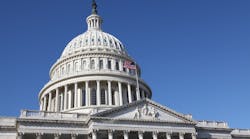House Appropriations committee passes DOT spending bill with trucking riders intact
Complicated slightly by a fatal Amtrak crash the night before, the Republican majority prevailed in a partisan House Appropriations hearing Wednesday to set the coming year’s spending for the Dept. of Transportation. Along with generally tight budget limits and a tighter rein on federal regulation, the bill to fund Transportation, Housing and Urban Development (T-HUD) also provides the trucking industry with some relief from hours of service restrictions, insurance increases and trailer length limits.
Broadly, Republican leadership on the Appropriations committee and the transportation subcommittee took credit for maintaining spending levels despite the restrictions imposed by the current Congressional budget agreement, and for delivering to the budget bills to the House floor in a timely fashion.
Democrats decried those constraints, and challenged the committee’s Republicans to come up with a truly bipartisan spending plan based on the nation’s domestic needs—particularly a crumbling transportation infrastructure—and not on Tea Party-imposed austerity.
As for the trucking points, an expected challenge to several provisions in the bill failed to gain any support from members other than Democrats, but the minority party didn’t give in without a fight.
“I’m strongly opposed to the policy riders that were attached to this bill. Controversial riders generally shouldn’t be attached to an appropriations bill, and those on truck length and weight have no place, in particular on this bill,” said Rep. David Price (D-NC), the ranking member of the transportation subcommittee. “In addition, the bill continues to delay full implementation of DOT’s hours of service rule, despite the fact that the study we requested last year is underway. I’m concerned that these modifications are a calculated effort by the trucking industry to put the bottom line above driver safety.”
And Rep. Nita Lowey (D-NY), ranking member of the full committee, also used her opening remarks to blast the policy riders. She repeated criticisms she’d made when the bill was passed out of the subcommittee, once again saying “Christmas came early for the trucking industry.”
“Longer, heavier trucks, stalled enforcement of hours of service rules, inadequate insurance requirements—controversial riders have no place in an already difficult appropriations process,” Lowey said.
Rep. Mario Diaz-Balart (R-FL), who crafted the bill as chairman of the transportation subcommittee, responded to Price’s amendment to strip the trucking riders from the spending package by arguing that the provisions “address well known problems of over-regulation,” and they will not hurt road safety.
Rep. Chuck Fleischmann (R-TN) defended the riders by noting the importance of trucking to the nation’s economy, and he specifically cited the role of small carriers and independent truckers, calling them the hard-working “backbone” of industry. He voiced support for the rider that would block any increase in the minimum financial responsibility standard, saying such an increase would impose “a tremendous burden” on small-business carriers.
Similarly, Rep. Chris Stewart (R-UT) called the riders a defense against “the heavy hand of government on small business,” and openly asked committee members how many of them had ever been kept awake by wondering how they were going to make payroll at week’s end.
“That is a religious experience, and it changes the way you view the relationship with government,” Stewart said, noting the damage that will be done to small trucking companies by an insurance increase. “The people who love this are government regulators, people who don’t drive trucks—people who don’t even driver their own cars any longer. What is the need, what benefit is going to come from this intrusion?”
An appeal by Democrats for tighter safety controls on trucking failed to sway any cross-over votes, and the Price amendment was defeated in a party-line vote. A subsequent amendment by Rep. Chaka Fattah (D-PA) that focused only on the carrier insurance rider was withdrawn.
ATA pushes to protect restart rider
American Trucking Assns., which has defended the riders since the subcommittee consideration, did its part to clear up any misconceptions about the various policy points.
ATA made a special effort to garner support for protecting the current restart rule suspension, joining with more than 120 other organizations in a letter to Appropriations committee members. The letter highlighted the need for Congress to prevent the Federal Motor Carrier Safety Administration from “skewing results of its study to fit its own conclusions”—conclusions that run counter to the industry’s experience under the agency’s “onerous” restart restrictions.
“It would ensure that FMCSA’s study is representative of all drivers who use the restart provision and that it considers the full impact of putting more trucks onto the road during daytime traffic,” the letter said. “Moreover, the provision would prevent insignificant results from being used to justify wide-reaching regulations.”
Without the stronger language, ATA argued that FMCSA could be allowed to reimpose the restrictions once its current study is completed—even if that study shows the restart restrictions were overly constricting and harmful to public safety. The restart suspension was included as part of the omnibus spending plan for the current year, passed last December.
If passed by the House, the next T-HUD appropriation would have to be reconciled with a Senate version and signed by the president before becoming law. The 2016 federal fiscal year begins Oct. 1.



